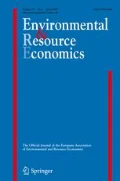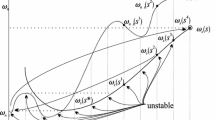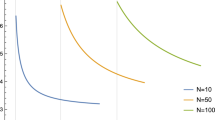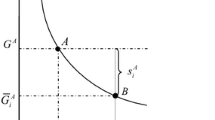Abstract
This paper uses a coalition formation model to explore how equity considerations affect countries’ cooperation on global environmental issues, e.g. on climate change. When developing countries are exempted from obligations to reduce their emissions, I find that opening them for abatement projects financed by industrialized countries changes the incentives to cooperate in a way which can increase emissions and decrease welfare. Equity- concerns in industrialized countries regarding the difference between their per capita emission levels and those of developing countries lead to increased abatement but do not qualitatively change the incentives to cooperate. Inequality-aversion with respect to differences to abatement targets across industrialized countries generally induces larger coalition sizes and stricter abatement. Here, the inclusion of developing countries improves upon the prospects of cooperation.
Similar content being viewed by others
References
S. Barrett (1994) ArticleTitle‘Self Enforcing International Environmental Agreements’ Oxford Economic Papers 46 878–894
S. Barrett (1997) ‘Heterogeneous International Environmental Agreements’ C. Carraro (Eds) International Environmental Agreements: Strategic Policy Issues E. Elgar Cheltenham 9–25
S. Barrett (2001) ArticleTitle‘International Cooperation for Sale’ European Economic Review 45 1835–1850 Occurrence Handle10.1016/S0014-2921(01)00082-4
Böhringer, C. and C. Helm (2001), ‘Fair Division with General Equilibrium Effects and International Climate Politics’, ZEW Discussion Paper No. 01–67, Mannheim.
C. Böhringer C. Vogt (2004) ArticleTitle‘The Dismantling of a Breakthrough: The Kyoto-protocol as Symbolic Policy’ European Journal of Political Economy 20 597–617 Occurrence Handle10.1016/j.ejpoleco.2004.02.004
Bosello, F., B. Buchner, C. Carraro and D. Raggi (2001), ‘Can Equity Enhance Efficiency? Lessons from the Kyoto Protocol’, Nota di Lavoro 49.2001, FEEM, Venice.
G. E. Bolton A. Ockenfels (2000) ArticleTitle‘ERC: A Theory of Equity, Reciprocity, and Competition’ The American Economic Review 90 166–193 Occurrence Handle10.1257/aer.90.1.166
M. Botteon C. Carraro (1997) ‘Burden Sharing and Coalition Stability in Environmental Negotiations with Asymmetric Countries’ C. Carraro (Eds) International Environmental Agreements: Strategic Policy Issues E. Elgar Cheltenham 26–55
C. Carraro D. Siniscalco (1993) ArticleTitle‘Strategies for the International Protection of the Environment’ Journal of Public Economics 52 309–328 Occurrence Handle10.1016/0047-2727(93)90037-T
Cazorla, M. V. and M. A. Toman (2001), ‘International Equity and Climate Change Policy’, in M. A. Toman ed., Climate Change Economics and Policy (pp. 235–247). Washington: RFF Press
W. Fichtner S. Graehl O. Rentz (2003) ArticleTitle‘The Impact of Private Investor’s Transaction Costs on the Cost-effectiveness of Project-based Mechanisms’ Climate Policy 3 249–259 Occurrence Handle10.1016/S1469-3062(03)00027-5
M. Finus S. Tjøtta (2003) ArticleTitle‘The Oslo Protocol on Sulfur Reduction: The Great Leap Forward?’ Journal of Public Economics 87 2031–2048 Occurrence Handle10.1016/S0047-2727(02)00042-7
M. Hoel (1992) ArticleTitle‘International Environmental Conventions: The Case of Uniform Reductions of Emissions’ Environmental and Resource Economics 2 141–159
M. Hoel K. Schneider (1997) ArticleTitle‘Incentives to Participate in an International Environmental Agreement’ Environmental and Resource Economics 9 153–170 Occurrence Handle10.1023/A:1026486715088
T. Jeppesen P. Andersen (1998) ‘Commitment and Fairness in Environmental Games’ N. Hanley H. Folmer (Eds) Game Theory and the Environment Edward Elgar Cheltenham 65–83
A. Lange C. Vogt (2003) ArticleTitle‘Cooperation in International Environmental Negotiations due to a Preference for Equity’ Journal of Public Economics 87 2049–2067 Occurrence Handle10.1016/S0047-2727(02)00044-0
J. C. Murdoch T. Sandler (1997) ArticleTitle‘The Voluntary Provision of a Pure Public Good: The Case of Reduced CFCs Emissions and the Montreal Protocol’ Journal of Public Economics 63 331–349 Occurrence Handle10.1016/S0047-2727(96)01598-8
Raymond, L. (2003), ‘Private Rights in Public Resources – Equity and Property Allocation in Market-Based Environmental Policy, Resources for the Future’, Washington, DC.
T. Schelling (1960) The Strategy of Conflict Harvard University Press Cambridge
R. Tol (2000) ‘Equitable Cost–benefit Analysis of Climate Change’ C. Carraro (Eds) Efficiency and Equity in Climate Change Policy Kluwer Dordrecht
UNFCCC (1992), ‘United Nations Framework Convention on Climate Change’, New York.
Author information
Authors and Affiliations
Corresponding author
Rights and permissions
About this article
Cite this article
Lange, A. The Impact of Equity-preferences on the Stability of International Environmental Agreements. Environ Resource Econ 34, 247–267 (2006). https://doi.org/10.1007/s10640-005-0006-4
Accepted:
Issue Date:
DOI: https://doi.org/10.1007/s10640-005-0006-4
Keywords
- coalition formation
- equity preference
- inequality aversion
- international environmental negotiations
- per capita emission levels




